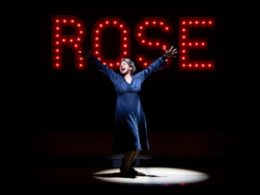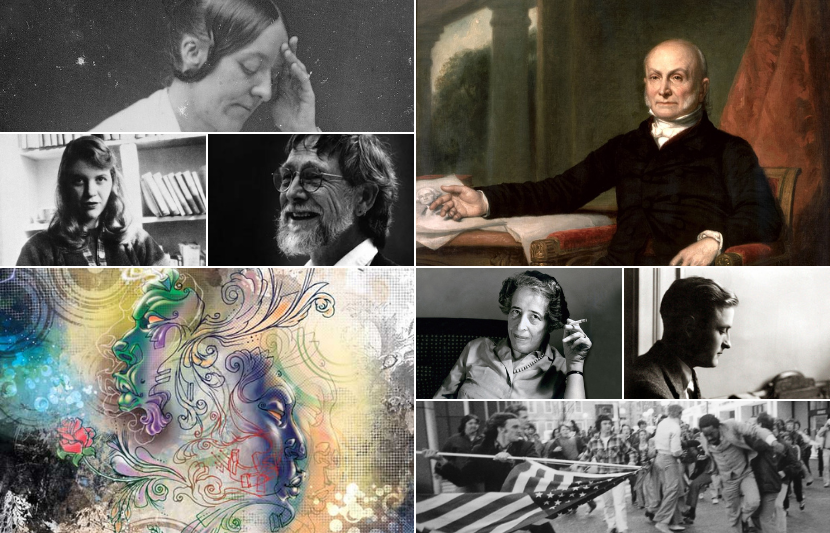
Clockwise from upper left: Margaret Fuller (National Portrait Gallery), John Quincy Adams (The White House Historical Association), Hannah Arendt (The Hannah Arendt Center for Politics and Humanities), F. Scott Fitzgerald (Public Domain), “The Soiling of Old Glory” by Stanley Foreman (Boston Herald American, 1976), “The Before and After” (Stacey Robinson), Gary Snyder (Smith College), and Sylvia Plath (Poetry Foundation / Bettmann / Getty Images)
For a country not even 250 years old, the United States has managed to produce a national literature to rival any in the world, and Library of America is committed to showcasing the full range of that accomplishment. Case in point: our Spring 2025 season of new releases, which encompasses everything from the profound and prescient writings of our sixth president to the remarkable flowering of twenty-first century Black speculative fiction. A groundbreaking feminist thinker enters the LOA series, the “poet laureate of deep ecology” marks his ninety-fifth birthday with a landmark edition of his essential prose, and an acclaimed translator peels back the myths and mischaracterizations surrounding one of the most beloved and enigmatic of American poets.
Browse the list below for information about contents and publication dates, and click here for a full description of each new release.
LIBRARY OF AMERICA SERIES
Margaret Fuller: Collected Writings
Brigitte Bailey, Noelle Baker, and Megan Marshall, editors
Library of America #388 / ISBN 978–1–59853-803–8
February 2025
John Quincy Adams: Speeches & Writings
David Waldstreicher, editor
Library of America #390 / ISBN 978–1–59853–808–3
March 2025
Hannah Arendt: The Origins of Totalitarianism
Expanded Edition
Jerome Kohn and Thomas Wild, editors
Library of America # 389 / ISBN 978–1–59853–806–9
April 2025
Jim Crow: Voices from a Century of Struggle
Part Two: 1919–1976 | Tulsa to the Boston Busing Crisis
Tyina L. Steptoe, editor
Library of America #387 / ISBN 978–1–59853–801–4
April 2025
Gary Snyder: Essential Prose
Jack Shoemaker, editor
Library of America # 391 / ISBN 978–1–59853–810–6
May 2025
SPECIAL PUBLICATIONS
The Annotated Great Gatsby
100th Anniversary Deluxe Edition
F. Scott Fitzgerald
Introduction by Amor Towles
James L. W. West III, editor
ISBN 978–1–59853–805–2
March 2025
I Am the Arrow: The Life and Art of Sylvia Plath in Six Poems
Sarah Ruden
ISBN 978–1–59853–813–7
March 2025
PAPERBACK
The Black Fantastic: Twenty Afrofuturist Stories
andré m. carrington, editor
ISBN 978–1–59853–811–3
February 2025
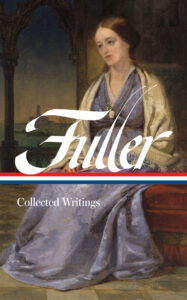
Edgar Allan Poe wrote that humanity could be divided into three classes: “men, women, and Margaret Fuller.” The radical transcendentalist, intrepid journalist, pioneering feminist, and revered peer of Henry David Thoreau and Ralph Waldo Emerson joins Library of America with the most authoritative single-volume collection of her writings ever published. In the course of her brief life, cut short at forty in a shipwreck off the coast of New York’s Fire Island, Fuller gained a reputation as a woman of bold action and brilliant ideas. Here are her two best-known books: Summer on the Lakes, in 1843, part travel account, part broadside on behalf of Indigenous American rights; and Woman in the Nineteenth Century, the foundational document of American feminism. Joining these major works are a generous selection of Fuller’s shorter publications, including experimental fiction in The Dial, columns in the New-York Tribune, and war correspondence from besieged Rome in 1849. Unpublished writings and selections from her journals, a brace of letters (three newly translated from the original Italian), and a chronology by Fuller’s biographer and volume editor Megan Marshall bring us closer than ever to this sui generis figure about whom Emerson wrote: “She was an active, inspiring companion and correspondent, and all the art, the thought, the nobleness in New England seemed at that moment related to her and she to it. She was everywhere a welcome guest.”
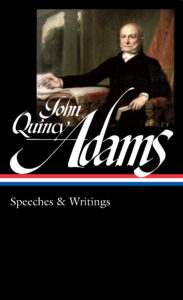
John Quincy Adams was one of the most accomplished American statesmen of his or any era. Over the course of a long and storied career he brought all his eloquence, erudition, and energy to bear on the politics of our nation. “His values, his definition of leadership, and his vision for the nation’s future—particularly the difficulty of transforming vision into reality in a country that often appears ungovernable—are as much about twenty-first-century America as about Adams’ life and times,” writes biographer Fred Kaplan. Here in an edition for general readers are the profound insights of this far-seeing leader and consummate literary stylist. From his prophetic college commencement address in 1787 to his vigorous denunciation of slavery in 1843, this volume offers a compelling record of our nation’s fractious evolution as a democratic republic through the words of one of its greatest champions and most astute critics. Capping LOA’s three-volume John Quincy Adams edition, this release marks the tenth volume in our Adams Family Collection.
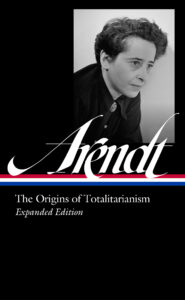
A German-Jewish refugee from Nazi persecution, Hannah Arendt sought, from her exile in New York City, to address the twin horrors of the Soviet gulag and the Holocaust in her 1951 magnum opus, The Origins of Totalitarianism. Facing head-on the question of how governments exert absolute control over citizens, terrorizing them and enlisting them to commit atrocities on their behalf, she contended that totalitarian politics remain an enduring feature of contemporary life—a danger left uneradicated by the Allied victory in World War II and a continual temptation for anti-democratic demagogues. The Library of America edition of this indispensable and influential work, newly annotated and based on the final version Arendt revised in her lifetime, restores to print her “Concluding Remarks” to the 1951 first American edition and an expurgated chapter on the Soviet suppression of the Hungarian revolt of 1956. “Engrossing and fascinating in the way that a novel is,” as Mary McCarthy remarked, this deeply researched, never-more-relevant work positions Arendt, a half-century after her death, as a preeminent thinker and political philosopher for the twenty-first century.
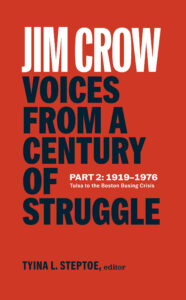
The second part of LOA’s Jim Crow: Voices from a Century of Struggle examines the fraught history of the American color line from the Tulsa Massacre of 1921 to the Boston desegregation busing crisis of the 1970s. Edited by historian and radio host Tyina L. Steptoe, this anthology brings together more than ninety speeches, pamphlets, articles, judicial opinions, and poems to explore the many ways Americans of all backgrounds and identities fought white supremacy and envisioned a better nation in the face of disenfranchisement, lynching, mob violence, and police brutality. Alongside pieces by such transformative figures as Rosa Parks, Paul Robeson, James Baldwin, and Chief Justice Earl Warren are blues lyrics sung by Bessie Smith and Big Bill Broonzy, oratory by Marcus Garvey and Stokeley Carmichael, and Ann Moody on her childhood in segregated Mississippi. A vital resource for engaging with the vexed history of race in America, this collection serves as a crucial reminder of where we’ve been, how far we’ve come, and how long the road ahead remains.
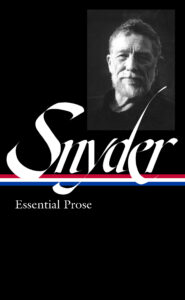
Gary Snyder, one of only five living writers in the LOA series, has been called the “poet laureate of deep ecology,” but his incandescent prose writing forms an equally vital part of his seventy-year career. On the heels of an edition of his collected poems, this volume, edited by Jack Shoemaker and prepared with the assistance of the author, collects the best of Snyder’s published prose: philosophical essays, travel journals, poetic notebooks, reflections on Buddhism, environmental polemics, memoirs, speeches, interviews, and letters. Follow his recollections of working as a fire lookout in Washington State in the early 1950s, his experiences as an initiate in a Kyoto monastery, and his six-month pilgrimage to India with Allen Ginsberg. Published on the occasion of Snyder’s ninety-fifth birthday, this volume is a fitting tribute to our greatest living guide to the nature of meaning and the meaning of nature.
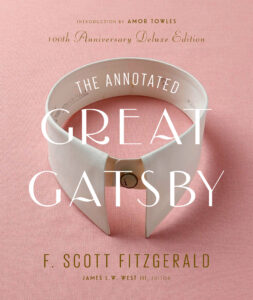
Boats against the current, we are borne back ceaselessly to The Great Gatsby, F. Scott Fitzgerald’s timeless story of class, money, doomed love, and the dark side of the American dream. For its 100th anniversary, LOA presents a deluxe annotated and illustrated edition featuring illuminating commentary by preeminent Fitzgerald scholar James L. W. West III. Dozens of images, many in full color, vividly recreate the Jazz Age world of Fitzgerald’s most famous work and chronicle its rich cultural afterlife. A new introduction by best-selling author Amor Towles (A Gentleman in Moscow) accompanies a corrected text.

Sarah Ruden (photo: Adrienne Malane)
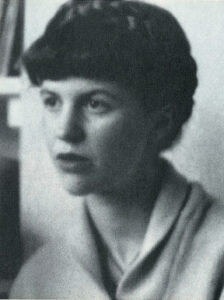
Sylvia Plath (Public Domain)
Sylvia Plath was an extraordinary, haunting poet whose suicide at age thirty placed her in the posthumous pantheon of enigmatic American geniuses. In I Am the Arrow: The Life and Art of Sylvia Plath in Six Poems, acclaimed translator Sarah Ruden shares a fresh reading of this beloved yet often misunderstood voice, spotlighting her miraculous artistic range and towering ambition. Through deep and illuminating readings of “Mushrooms,” “You’re,” “The Babysitters,” “The Applicant,” “Ariel,” and “Edge,” Ruden contends that Plath was a consummate mythmaker on the order of the ancient Greeks. Though the details of her biography have often colored readers’ relationships with Plath, Ruden makes a convincing case for her “enshrinement, on purely literary merit, in the cool and politically agnostic mainstream of literary greatness.”

andré m. carrington (University of California, Riverside)
Finally, venturing into one of the most vital and imaginative strains to emerge from American letters in recent decades, The Black Fantastic: Twenty Afrofuturist Stories investigates the cutting edge of contemporary speculative fiction. In these mind-blowing, horror-strewn stories from Hugo, Nebula, and Stoker award-winning Black authors, selected by editor andré m. carrington, we see a new generation of writers, some just beginning their careers, conjuring up a renaissance that builds on the stellar legacies of such influential forebears as Octavia E. Butler and Samuel R. Delany. Reclaiming histories of racism and oppression via the vast possibilities of fiction, these writers are forging kaleidoscopic new visions of Black identity, community, and artistic freedom.


